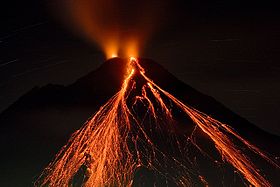Arenal Volcano
| Arenal | |
|---|---|

Arenal in November 2006
|
|
| Highest point | |
| Elevation | 1,670 m (5,480 ft) |
| Coordinates | 10°27′48″N 84°42′12″W / 10.46333°N 84.70333°WCoordinates: 10°27′48″N 84°42′12″W / 10.46333°N 84.70333°W |
| Geography | |
| Location | Alajuela Province, Costa Rica |
| Geology | |
| Age of rock | 7,000 years old |
| Mountain type | Stratovolcano |
| Last eruption | 1968 to 2010 |
Arenal Volcano (Spanish: Volcán Arenal) is an active andesitic stratovolcano in north-western Costa Rica around 90 km northwest of San José, in the province of Alajuela, canton of San Carlos, and district of La Fortuna. The Arenal volcano measures at least 1,633 metres (5,358 ft) high. It is conically shaped with a crater 140 metres (460 ft) in diameter. Geologically, Arenal is considered a young volcano and it is estimated to be less than 7,500 years old. It is also known as "Pan de Azúcar", "Canaste", "Volcan Costa Rica", "Volcan Río Frío" or "Guatusos Peak".
The volcano was dormant for hundreds of years and exhibited a single crater at its summit, with minor fumaroles activity, covered by dense vegetation. In 1968 it erupted unexpectedly, destroying the small town of Tabacón. Due to the eruption three more craters were created on the western flanks but only one of them still exists today. Since 2010, Arenal has been dormant.
Arenal is one of seven historically active Costa Rican volcanoes along with Poás, Irazú, Miravalles, Orosí, Rincón de la Vieja complex, and Turrialba. It was Costa Rica's most active volcano until 2010, and one of the ten most active volcanoes in the world. It has been studied by seismologists for many years.
The volcano is located at the center of Arenal Volcano National Park in the northern zone of the country, 15 kilometres (9.3 mi) southwest of the La Fortuna district in San Carlos (canton), Costa Rica. The temperature varies from 9 °C (48 °F) in the high areas to 89 °C (192 °F) in the low areas and the annual rainfall is around 349 centimetres (137 in).
...
Wikipedia

